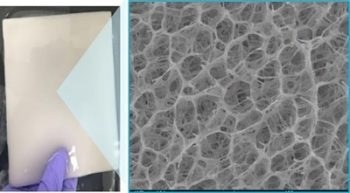As the human population grows and pollution affects freshwater sources, access to clean water is becoming increasingly difficult. Now, researchers reveal in the journal ACS Central Science how loofah sponges served as the inspiration for a sunlight-powered porous hydrogel that could purify enough water to meet someone’s needs daily—even when it is overcast.

A porous hydrogel inspired by loofah sponges absorbs polluted water at room temperature and then rapidly releases purified water when heated. Image Credit: Adapted from ACS Central Science 2023, DOI: 10.1021/acscentsci.2c01245
In the past, experts have proposed that sunlight-driven evaporation would be a low-energy method of water purification; however, this strategy fails when it is cloudy.
Poly (N-isopropyl acrylamide) (PNIPAm), a type of temperature-responsive hydrogel, is one potential remedy. PNIPAm absorbs water at lower temperatures and repels it at higher levels.
Traditional PNIPAm gels, on the other hand, have closed-off pores that make it difficult for them to produce clean water quickly enough to suit people’s demands.
Natural loofahs, on the other hand, which many people use to exfoliate in the shower, have big, open, and linked pores. To create a hydrogel that could quickly release purified water when heated by the sun’s rays in bright or overcast circumstances, Rodney Priestley, Xiaohui Xu, and colleagues sought to mimic the structure of the loofah in PNIPAm.
The researchers created a PNIPAm hydrogel with an open pore structure that resembles a natural loofah using a water and ethylene glycol combination as a radically new polymerization medium.
The inside pores of the opaque hydrogel were then coated with polydopamine (PDA) and poly(sulfobetaine methacrylate) (PSMBA), and the material was evaluated under artificial light with a solar-like intensity.
When heated by artificial light, it absorbed water at ambient temperature and released 70% of that water in 10 minutes, which is a rate four times faster than that of a previously reported absorber gel. According to the experts, at this rate, the material might supply a person’s everyday requirements.
Additionally, it took 15 to 20 minutes for the material to release a similar proportion of stored water under reduced lighting circumstances that replicated a partially overcast sky.
Finally, samples contaminated with organic colors, heavy metals, oil, and microplastics were used to evaluate the new loofah-like material. In every test, the gel significantly improved the water’s purity.
For instance, water samples containing around 40 parts per million (ppm) of chromium were treated twice, absorbed, and discharged with less than 0.07 ppm of chromium, which is the permitted level for drinking water.
The distinctive hydrogel structure that the researchers developed may be valuable in other applications, including medication delivery, smart sensors, and chemical separations, according to the researchers.
The National GEM Consortium, the Eric and Wendy Schmidt Transformative Technology Fund at Princeton University, the Project X Fund at Princeton University, Princeton University Presidential Postdoctoral Fellowship, and the Princeton Catalysis Initiative have provided funding to the authors. They also acknowledge support from the US National Science Foundation.
Journal Reference
Xu, X., et al. (2023) Quick-Release Antifouling Hydrogels for Solar-Driven Water Purification. ACS Central Science. doi:10.1021/acscentsci.2c01245.